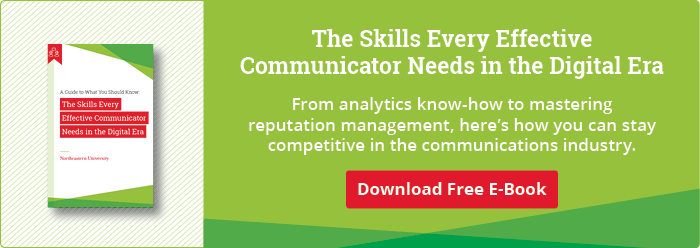Editor’s note: This post originally appeared on the Communications Alumni Network Blog.
The role of the Chief Communication Officer (CCO) is evolving rapidly in this era of digital disruption. Communication leaders and their teams are uniquely positioned to help nurture the kind of high-velocity cultures that will help organizations thrive, according to research by McKinsey & Company. Not surprisingly, this also means that communication leaders are increasingly expected to actively participate in the formulation and implementation of business strategy.
What, then, are the skills, competencies, and attributes that organizations are looking for in their communication leaders?
What Does it Take to Become a Chief Communication Officer?

To find out, we examined the job listings for 42 organizations across a range of sectors seeking a ‘vice president, corporate communications’ on Indeed.com during February 2017. The sample included only job listings seeking someone for the CCO role, rather than specific communication functions, such as public relations or marketing communications.
What we learned is that organizations expect to see three primary ‘clusters’ of competency and experience in the backgrounds of candidates for the CCO role. Note as well that there is considerable overlap between the three clusters. This sample of job descriptions yielded hundreds of discrete skills, attributes, areas of knowledge, qualifications, and experiences. In our analysis, we searched for patterns within this mass of data to identify larger clusters of competency.
How to Become a Chief Communication Officer
1. Experience
The first requirement is an average of ten years of experience in a specific sector. A pharmaceutical firm, for example, seeks candidates who have lengthy, hands-on experience in functional roles within the industry. ‘Understanding the business’ is, therefore, a core requirement.
2. The Right Skills and Qualities
The second cluster comprises a wide range of personal attributes and interpersonal skills. Some of these attributes are personality characteristics—a sense of good humor or creativity—and others are interpersonal skills that can be strengthened as part of a formal or informal development process.
The seven most frequently mentioned attributes among CCO job postings are:
- Team orientation
- A collaborative approach
- Negotiation skills
- Mentoring abilities
- Versatility
- Credibility
- Relationship building skills
3. Core Competencies
The third cluster encompasses a range of competencies, as shown in the chart below. Of course, these areas of competency are interdependent: Communication skills, for instance, underpin all the others, and strategic thinking must inform resource management and stakeholder management. 
Within the MS in Corporate and Organizational Communication, we have translated these competencies into the learning experiences that will help prepare our students for leadership roles.
Learn more about the communication skills required to succeed in today’s business world by downloading our free guide below.







Related Articles
Faculty Insights: What Do Employers Look for in a New Candidate?
Virtual Co-op Evolves Into a Social Platform WomenVotes.org
Why You Should Consider a Career in Technical Writing